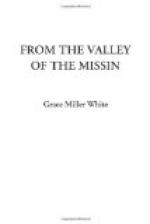“My dear fellow,” he replied calmly, “I don’t exactly know where she is; but I can say that I’ve had a note from her father, telling me that she was with him in New York, and safe. I suppose it won’t be necessary to tell you that she was not compelled to go?”
Horace whitened with suppressed rage. He was now convinced that the suavity of his colleague concealed a craftiness he had never suspected, and he felt sure that Everett had taken advantage of his absence to strike an underhanded blow. Banishing a desire to fell the other to the floor and then choke the secret from him, he decided to ply all the craft of his profession, and draw the knowledge from Brimbecomb by a series of pertinent queries.
“May I see the communication you have received from Cronk?”
Everett seemed to have expected the question; for he made a brave pretense of looking through his wallet for the fictitious letter. He took up the space of several minutes, arranging and rearranging the documents. Then, as he looked at Horace, a paper fluttered to the floor, unobserved by him.
“On second thought,” said he, “I think it wouldn’t be quite right to show you a private letter from one of my clients. I have told you enough already. I’m sorry, but it’s impossible for me to let you see it.”
Everett mentally congratulated himself upon his diplomacy, while Horace bit his lip until it was ridged white. In his disappointment he cast down his eyes, and then it was that his attention was called to the paper Brimbecomb had dropped on the floor. He changed his position, and when he came to a standstill his foot was planted squarely on the paper. For a moment Horace was under the impression that Everett had seen him cover the letter; but the unruffled egotism on the face of the other betrayed no suspicion.
“Who ordered the withdrawal of the deputy?” Horace demanded.
Everett knew that the lies he told would have to be consistent; so he repeated what he had said to Ann.
“I don’t know,” Everett said. “I didn’t.”
Horace gazed at his companion for several seconds.
“Something tells me that you’re lying,” he said finally.
An evil change of expression was the only external sign of Brimbecomb’s longing to throttle Horace.
“A compliment, I must say, my dear Shellington,” he said; “and the only reason I have for not punching you is—Ann.”
The other’s eyes narrowed ominously.
“Ann is the one who is keeping me from thumping you, Brimbecomb. If you know anything of Fledra Cronk, I want you to tell me.”
“I’ve told you all I know,” Everett answered.
“For Ann’s sake, I hope you’ve told me the truth; but, if you haven’t, and have done anything to my little girl, then God protect you!”
The last words were uttered with such emotional decision that Everett’s first real fear rose within him. With difficulty he held back a torrent of words by which he might exonerate himself. Instead, he said:




